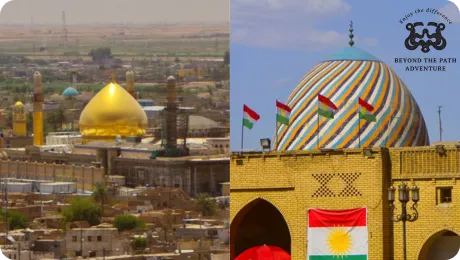Southern Iraq and Iraqi Kurdistan | differences + similarities
Who are the Kurds? Is there a country called Kurdistan? Are Kurds and Iraqis the same? What is the relationship between Iraq and Kurdistan?
Iraq is a multi-ethnic state with a population of over 40 million people located in Western Asia. The country is a member of the United Nations, the Arab League, and the Organization of Islamic Cooperation.
Iraqi Kurdistan is an autonomous region in northern Iraq, with its own government, parliament, and military. The Kurdish people, who make up about 15-20% of Iraq’s population, have a long history of seeking autonomy and self-determination.
Let’s find out the differences, similarities and how to travel between Iraqi Kurdistan and Southern Iraq.
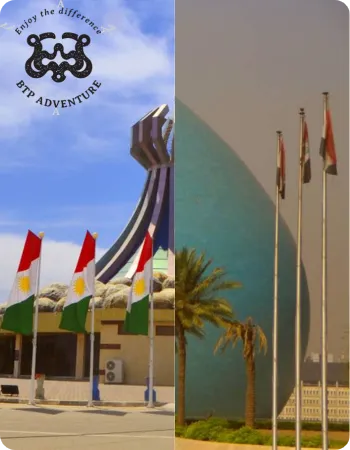
Differences between Kurdistan and Iraq
To fully understand the differences between Iraqi Kurdistan and Iraq, let’s explore their political status, ethnicity, culture, geography, economic development, and security landscapes.
Political Autonomy: Navigating the Balance
Iraqi Kurdistan enjoys a special status within Iraq. It holds the distinction of an autonomous region, granting it a degree of self-governance to manage its internal affairs. This autonomy extends to education, healthcare, and security, allowing the region to chart its own path. However, Iraqi Kurdistan still remains a part of Iraq’s federal structure, subject to the overarching authority of the central government in Baghdad. This delicate balance between autonomy and sovereignty has been at the heart of ongoing negotiations and political discussions between the two entities.
Ethnic Tapestry: A Kurdish Heritage surrounded by Diversity
Ethnicity plays a significant role in shaping the identity of both Iraqi Kurdistan and Iraq. Iraqi Kurdistan is predominantly Kurdish, with a rich and vibrant heritage spanning centuries. Their distinctive language, traditions, and customs reflect their unique identity, evident in their music, literature, architecture, and folklore.
In contrast, Iraq is a mosaic of ethnicities, comprising Arab, Kurdish, Turkmen, Assyrian, and other groups. This diversity has contributed to the rich tapestry of Iraqi society, with each group bringing its unique flavors to the table. While Kurds form a significant portion of Iraq’s population, they are not the majority group.
| Ethnic Group | Estimated Percentage | Notes |
| Arab | 75-80% |
Largest group, comprising various Arab sub-groups like Sunni Arab, Shi’a Arab, and Arab Christians.
|
| Kurd | 15-20% |
Predominantly concentrated in Iraqi Kurdistan, with significant presence in other parts of the country.
|
| Turkmen | 2% |
Primarily located in northern Iraq, with Turkic language and cultural ties.
|
| Assyrian | 1% |
Descendants of ancient Mesopotamian civilizations, with distinct language and Christian religious affiliation.
|
| Armenian | 0.30% |
Mainly concentrated in Baghdad and northern Iraq, with historical ties to the region.
|
| Other groups | 1.70% |
Smaller ethnicities present include Mandean, Circassian, Shabak, Yazidi, and Roma.
|
Geographic Contrasts: From Mountains to Plains
Iraqi Kurdistan’s landscape stands in stark contrast to the rest of Iraq. It’s characterized by rugged mountains, lush valleys, and a relatively cooler climate, a far cry from the arid plains of southern Iraq. This mountainous terrain has shaped the lifestyle and economic activities of the Kurdish people, who have thrived in agriculture, livestock herding, and tourism.
In contrast, Iraq’s topography is dominated by deserts or steppes, with a hot and dry climate. This geography has influenced their agriculture, with a focus on date palms and irrigation systems. The country’s oil and gas reserves are concentrated in the southern regions, contributing to the economic structure of the region.
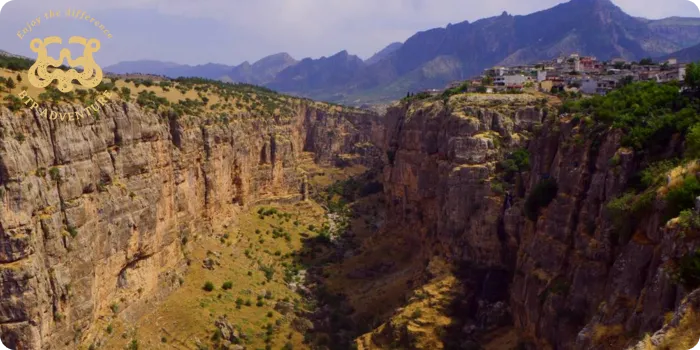 a valley in Iraqi Kurdistan
a valley in Iraqi Kurdistan
Economic Pathways: A Tale of Two Regions
Economic development has taken different trajectories in Iraqi Kurdistan and Iraq. Iraqi Kurdistan has experienced relatively faster economic growth compared to other parts of the country. This success is attributed to factors like attracting foreign investment, developing oil and gas resources, and promoting tourism. The region has also benefited from its relative political stability, creating a more conducive environment for business.
However, Iraq has faced significant challenges in its economic development. Decades of conflict, sanctions, and political instability have hampered economic growth. The country is still recovering from these challenges, and its economy faces ongoing obstacles. Nevertheless, there are signs of progress, with investments in agriculture, infrastructure, and energy sectors.
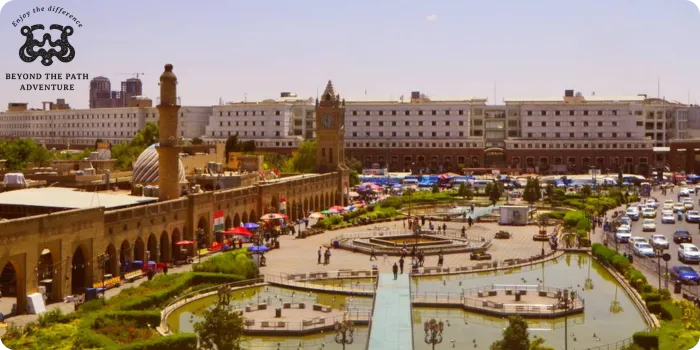 Erbil, Kurdistan
Erbil, Kurdistan
Security Challenges: Navigating Obstacles
Security concerns have had a profound impact on the development of Iraqi Kurdistan and Iraq. Iraqi Kurdistan has generally enjoyed greater stability and security compared to other parts of Iraq. This has made it an attractive destination for investment, tourism, and refugees. The region’s security stability is attributed to factors like a strong Kurdish security apparatus, support from the international community, and a relatively harmonious inter-ethnic relationship.
In contrast, Iraq has faced ongoing security threats from terrorism, ethnic and sectarian tensions, and political instability. These challenges have hindered economic growth, disrupted social cohesion, and posed significant human security concerns. The Iraqi government has been working to address these security challenges, but they remain a major obstacle to the country’s overall well-being.

Hi, I’m Dawid, a passionate tour guide with BTPadventure. I’ve explored over 100 countries and specialize in crafting memorable journeys to unique destinations in Africa, the Middle East, and Asia.
Similarities between Kurdistan and Iraq
Despite their distinct characteristics and political status, Iraqi Kurdistan and Iraq share some commonalities that have shaped their history and connection. Here are some notable similarities between the two regions:
Shared Geography and Natural Resources
Both Iraqi Kurdistan and Iraq are located in Western Asia, sharing a border and encompassing a vast area with diverse landscapes. Both regions hold significant oil and gas reserves, contributing to their economic potential.
Common History and Cultural Heritage
Iraqi Kurdistan and Iraq have a shared history, with ancient civilizations and empires once occupying their lands. Both regions have experienced periods of war, occupation, and political transformations, shaping their cultural heritage.
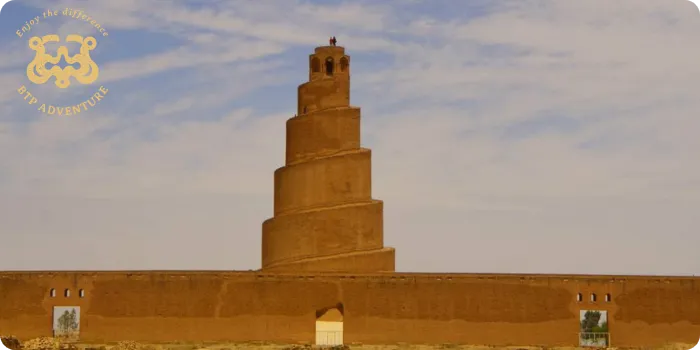 Malwiya Minaret, Samarra
Malwiya Minaret, Samarra
a UNESCO World Heritage site built by Abbasid Caliphs
Religious Diversity and Religious Tolerance
Both Iraqi Kurdistan and Iraq are home to a diverse range of religious groups, including Muslims, Christians, Yazidis, and others. Historically, both regions have exhibited a degree of religious tolerance, although tensions and conflicts have occurred at times.
Shared Interests in Stability and Development
Both Iraqi Kurdistan and Iraq share a common interest in achieving stability and promoting economic development. This shared aspiration has driven efforts to address security challenges, improve infrastructure, and attract foreign investment. Both regions recognize the importance of cooperation and collaboration to achieve sustainable development.
The Relationship between Kurdistan and Iraq
The relationship between the Kurdistan Region of Iraq (KRI) and Southern Iraq, also known as Iraq proper, has been characterized by a complex interplay of cooperation, tension, and mutual dependence. The two regions share a common history, culture, and ethnicity, but they also have distinct political and economic interests.
Historical Background
The Kurds have a long history of seeking autonomy or independence from the central government in Baghdad. This aspiration was fueled by the perceived marginalization of Kurds in Iraq and their desire for self-determination. In 1991, following the Gulf War, the KRI enjoyed a period of de facto independence, but this was curtailed following the U.S.-led invasion of Iraq in 2003. The new Iraqi constitution established a federal system with a degree of autonomy for the KRI, but it also left many key issues unresolved, leading to ongoing disputes between Baghdad and Erbil, the capital of the KRI.
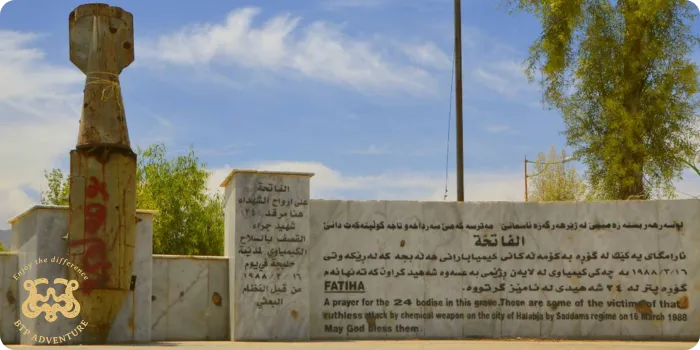 Halabja, Iraqi Kurdistan
Halabja, Iraqi Kurdistan
Post-2003 Relations
The relationship between the KRI and Baghdad has been marked by periods of cooperation and tension. In the early years after the U.S.-led invasion, the KRI played a key role in stabilizing Iraq and fighting the insurgency. However, tensions resurfaced over issues such as oil revenue sharing, the status of disputed territories, and the KRI’s independence referendum in 2017. The Iraqi government responded to the referendum by sending forces into disputed territories and imposing economic sanctions on the KRI.
Current Status
Despite their distinct political status, both Iraqi Kurdistan and Iraq are engaged in regional cooperation and diplomacy. The Iraqi government and the Kurdistan Regional Government (KRG) maintain a complex relationship, negotiating various issues from security to economic cooperation. Iraqi Kurdistan benefits from trade and investment with Iraq, while Iraq relies on resources from Iraqi Kurdistan. Both regions face economic challenges due to factors such as political instability, post-conflict reconstruction, and fluctuating oil prices. The KRI is a major exporter of oil and natural gas, and its economy is closely linked to the rest of Iraq. Both sides recognize the need to maintain stable relations in order to promote economic growth and stability. They also play a role in regional organizations and initiatives.
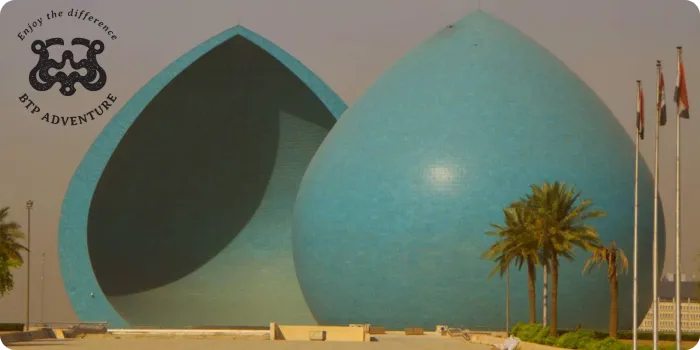 Alshaheed (Martyr) Monument, Baghdad
Alshaheed (Martyr) Monument, Baghdad
Future Prospects
The future of relations between the KRI and Baghdad is uncertain. The two sides need to find a way to resolve their differences and build a more cooperative relationship. This will require compromise from both sides and a willingness to address the root causes of the conflict.
Overall, the relationship between the KRI and Southern Iraq is complex and dynamic. There is both cooperation and tension, and the future of their relations is uncertain. However, it is clear that both sides need to find a way to work together in order to promote stability and economic development in Iraq.
How to travel between Iraq and Kurdistan
it is possible to travel between Iraq and Kurdistan, but there are a few things you should keep in mind.
- Visas: You will need a visa to enter Iraq and Kurdistan. Iraqi Kurdistan does not have its own passport or visa system, so you will need to obtain a visa from the Iraqi government. You can apply for a visa online or at an Iraqi embassy or consulate.
- Security: Security in both Iraq and Kurdistan can be a concern. The Iraqi government has made significant progress in improving security in recent years, but there are still parts of the country that are dangerous. Kurdistan is generally considered to be safer than other parts of Iraq, but there is still a risk of terrorism and other security threats.
- Border crossings: There are several border crossings between Iraq and Kurdistan. The most popular crossing is at the Fishkhabur Bridge, which is located on the main highway between Sulaymaniyah and Irbil. Other crossings include the Darbandikhan Bridge, which is located on the highway between Arbil and Khanaqin, and the Hajj Omran Bridge, which is located on the highway between Dohuk and Mosul.
- Transportation: There are a few different ways to travel between Iraq and Kurdistan. The most popular option is to fly into Erbil or Sulaymaniyah International Airport and then take a taxi or bus to your destination. You can also take a train or bus from Baghdad to Erbil or Sulaymaniyah.
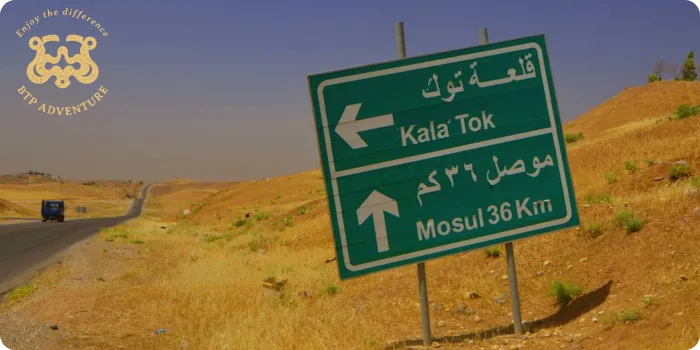
Here are some additional tips for traveling between Iraq and Kurdistan:
- Stay informed about the latest security warnings: The Iraqi Kurdistan Regional Government (KRG) and the Iraqi government publish regular security advisories. It is a good idea to check these advisories before you travel.
- Register with your embassy or consulate: If you are a citizen of a foreign country, you should register with your embassy or consulate when you arrive in Iraq or Kurdistan. This will help them to contact you if there is an emergency.
- Be careful of your belongings: Petty theft is a common problem in both Iraq and Kurdistan. Be sure to keep your belongings secure, especially in public places.
- Be respectful of local customs: Iraq and Kurdistan have rich cultures and traditions. Be sure to be respectful of local customs and practices.
- Have fun!: Despite the security concerns, both Iraq and Kurdistan are beautiful and fascinating places to visit. With a little planning and caution, you can have a great time exploring these two regions.

